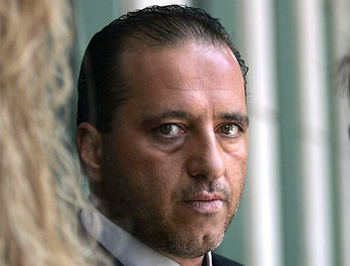The father of slain Escondido teenager Amber Dubois recognizes that legislation he plans to unveil Tuesday could receive a hostile reception in some Capitol corners.

Moe Dubois isn't sure what kind of reception he'll get from the Legislature when he tries to introduce some sex-offender legislation. (John Gastaldo / Union-Tribune)
Nevertheless, Moe Dubois is convinced that requiring convicted sex offenders to always carry a distinctive driver's license or state-issued identification card will help police and businesses better protect children from predators.
"Do I think it's going to pass through smoothly? No," Dubois said in a telephone interview.
If it stalls, Dubois vows to bypass lawmakers by appealing directly to voters.
"I have a feeling it will get stopped in one of the committees. Then we'll pursue it via an initiative," he said. "There are many more people who want protection for their children from predators."
Assemblymen Paul Cook, R-Yucca Valley, and Pedro Nava, D-Santa Barbara, have signed on to jointly carry the driver's license measure as part of a four-bill package aimed at sex offenders.
Those proposals are designed to help law enforcement authorities more quickly respond when children are taken, including the formation of a state rapid response team of experts to assist local authorities responding to abductions.
Amber, 14, disappeared while on her way to school on Feb. 13, 2009. Her body was not found until a year later. John Albert Gardner III, 31, a convicted sex offender who had been released from parole supervision, earlier this month pleaded guilty to the rape and murder of Amber and 17-year-old Chelsea King, 17, of Poway. He is serving two life sentences without the possibility of parole.
Chelsea's parents, Kelly and Brent King, have been active in the campaign to pass "Chelsea's Law" that increases penalties for violent sexual crimes. Assembly Bill 1844 goes before the Assembly Appropriations Committee Friday.
Dubois and supporters plan to release his proposals Tuesday because May 25 is National Missing Children's Day, first proclaimed by President Reagan in 1983.
Under Assembly Bill 589, all registered sex offenders would be issued special driver's licenses that would identify them as such. If they do not drive, they must obtain a state-issued identification card, also with a distinctive mark.
The licenses or identification cards would have to be carried "at all times, outside of his or her place of residence," the bill states.
Supporters say that will help police quickly identify sex offenders and scrutinize circumstances such as a child as a passenger or a toy in the back seat.
"The second they walk up to a vehicle they should know who they're dealing with," Dubois said.
Also, businesses could voluntarily require identification at events catering to children to ensure that sex offenders are not scouting for their next victim, supporters say.
Nava and Cook agreed with Dubois that the measure will face stiff resistance from civil libertarians and others who argue that tighter restrictions will not necessarily make the streets safer. Opposition has yet to emerge, given the newness of the proposals. Cost estimates have not been prepared. Sen. Mark Leno, D-San Francisco, a frequent critic of crime crackdowns, said he had not seen the legislation.
"It's going to be tough," said Cook, adding law enforcement authorities he has talked to welcome the license. "They really like it. It gives them a chance to react quickly. It could make a big difference."
Said Nava, "I wouldn't be surprised at all if the Legislature objects to the reasonable approach. Then the citizens of this state will take it upon themselves to get the results."
Some states are ahead of California . Delaware, for example includes the letter "Y" on sex offender licenses. In Louisiana, it's "SEX OFFENDER" in all-capital orange letters.
Ernie Allen, president of the National Center for Missing and Exploited Children, said his organization has not taken a position on marking driver's licenses.
"We haven't analyzed the effect ... We'd have to know a lot more about how it would help," he said in a telephone interview.
But Allen is enthusiastic about other proposals to speed up responses.
"Time is the enemy in searching for a missing child," Allen said.
Less controversial, but far from a guaranteed signature by the governor, are three other measures:
- Assembly Bill 1022 would establish within the Department of Justice the "California Missing Children Rapid Response Team" that would be available to help local police when children disappear. The team would also assist local officials with protocols, programs and technologies related to abductions.
- Assembly Bill 34 would require the state to file within two hours information about a reported missing child under the age of 16 to the Violent Crime Information Center and the National Crime Information Center. The current requirement is four hours.
- Assembly Bill 33 would require the Commission on Peace Officer Standards and Training to develop specialized guidelines and courses for law enforcement related to investigating missing children cases. That measure also seeks to make it easier for law enforcement to target sex offenders who live within five miles of the scene of a crime.
Gov. Arnold Schwarzenegger, who supports Chelsea's Law, has not reviewed the new measures and does not have a position, said a spokeswoman.
Dubois has come up with a new proposal, which is much earlier in the formative stages. He wants to prevent impact statements from being released before victim families get to read them in court at sentencing. Dubois' statement was released before Gardner was sentenced on May 14.
"I truly felt victimized," Dubois said. "I want a law so that doesn't happen to a victim's family again."











